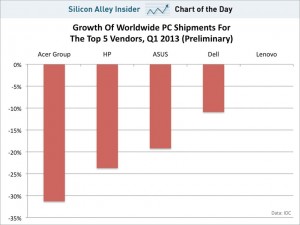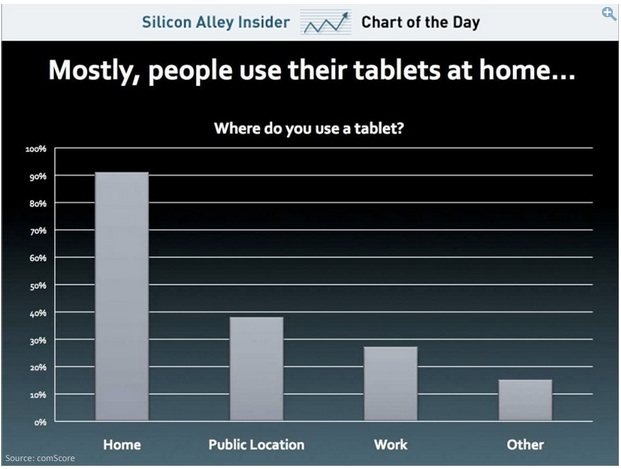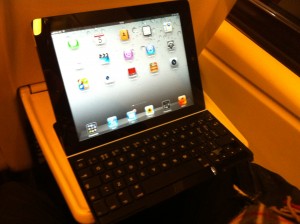All done on an iPad with Apple Pencil. For an explanation of how it was made, see here.
Category Archives: iPad
So the iPad is “done”. Really?
This morning’s Observer column:
My eye was caught by a headline in the Register, an invaluable online source of tech news and opinion. “Clearance sale shows Apple’s iPad is over. It’s done,” it read. This was a quotation from a piece by Volker Weber on the latest product announcements from Apple. “iPad is the biggest news,” he wrote, “and it says: the iPad is done. Apple is just refining the components, but there isn’t much they can do these days to make yet another super-duper Earth-shattering innovation here.”
Since I was reading this on my iPad Pro, which is probably the most useful electronic device I have ever owned, it came as a bit of a shock. But in fact Volker was really just articulating a truth about digital hardware, which is that the evolution of all such products (and a good deal else besides) follows a sigmoid curve.
It sounds complicated, but it isn’t really…
So what is the iPad Pro really for?
Horace Dediu’s video review of iPad Pro, based on the simple premise that it is the first product iOS product meant to be used on a desk. Nine minutes long and a good example of how to make an entertaining, thoughtful video.
Paper(less) aeroplanes
Well, well. The US Air force is buying 18,000 32G wifi-only iPads and expects to save $50M as a result.
Using lightweight iPads instead of heavy paper flight manuals will amount to $750,000 annual savings on fuel alone, a spokesman for the Air Force’s Air Mobility Command said in an interview with James Rogers of The Street. And the AMC will no longer have to print those flight manuals either, which will save a whopping $5 million per year.
Major Brian Moritz, manager of the AMC’s electronic flight bag program, said the Air Force expects Apple’s iPad to help save $5.7 million per year, which would result in savings “well over $50 million” over the next 10 years.
“We’re saving about 90 pounds of paper per aircraft and limiting the need for each crew member to carry a 30 to 40 pound paper file,” Moritz said. “It adds up to quite a lot of weight in paper.”
Rogers was embedded recently with the U.S. Air Force and got to see Apple’s iPad in action. He revealed that the switch from paper manuals to the iPad could cut up to 490 pounds in weight from a C-5 aircraft.
They’ll never work on Ryanair flights, though. The pilots would have to turn their iPad manuals off for take-off and landing, and so wouldn’t have a clue which levers to pull.
The PC: the new sunset industry
IDC says PC sales fell 14 percent in the first quarter on a year-over-year basis. That’s worse than its forecast of a 7.7 percent drop.
This is the worst quarter for PC industry since 1994 when IDC started tracking sales. So, that pretty much makes it the worst quarter in history.
IDC blames Microsoft’s Windows 8 operating system for alienating consumers. The new tile-based interface is too weird for consumers, says IDC.
Instead of buying new laptops or desktops, people are buying tablets and smartphones which serve as good-enough alternatives.
The Chatwin syndrome
This morning’s Observer column:
Bruce Chatwin has a lot to answer for. Specifically, he’s responsible for a forthcoming initial public offering (IPO) on the Italian stock market. It all goes back to something he wrote in his book The Songlines. He had arrived in Australia and was setting up a work space in a caravan. “With the obsessive neatness that goes with the beginning of a project,” he wrote, “I made three neat stacks of my ‘Paris’ notebooks. In France, these notebooks are known as carnets moleskines: ‘moleskine’, in this case, being its black oilcloth binding. Each time I went to Paris, I would buy a fresh supply from a papeterie in the Rue de l’Ancienne-Comédie.”
Chatwin goes on to relate how the notebooks were made by a small firm in Tours, the owner of which had died and whose heirs had sold the business. So he assumed that the source of his beloved notebooks had dried up. What he didn’t know was that the business had been bought by a Milanese stationer who eventually began producing the notebooks again. And what he could not have known was that the business would one day be floated on the stock market (3 April, to be precise). The IPO could value the company at up to €560m (£473m)…
Three Years On!
So tablets are just the latest version of the PC?
Interesting chart from Business Insider. Their commentary reads:
In November 2010, Facebook held an event at its headquarters to talk about new mobile products.
After the presentation, a reporter asked Mark Zuckerberg why there was no talk of a Facebook iPad app. At that point, the iPad was only a few months old, but it was already a phenomenon. Facebook hadn’t yet rolled out an app.“iPad’s not mobile, next question,” said Zuckerberg to laughs from the audience. He followed up saying, “It’s not mobile, it’s a computer, it’s a different thing.”
Apple had successfully marketed the lightweight, portable iPad as a mobile device. So the reporters in the room were incredulous that Zuckerberg didn’t call the iPad a mobile gadget.
Two years later, it’s clear that Zuckerberg was right. The iPad isn’t any more of a mobile gadget than a MacBook Air. The iPad is just a PC.
Up to a point, Lord Copper.
The future’s mobile. It might also be bleak
This morning’s Observer column.
But it’s when one sees how all these people access the net that the data leap into life. Meeker claims that the world now has 1.1 billion smartphone users, ie people who can access the internet and use the web via a handheld device. This trend is reinforced by other developments. A third of US adults now own a tablet or e-reader (up from 2% less than three years ago). And Apple’s iPad is the fastest-selling mobile device of all time (which, in the internet world, means “until the next Big Thing”). There’s a serious trend here.
The really staggering figures, however, are those relating to how people use their mobile devices. They already account for 13% of all internet traffic. This year, 24% of all online shopping on “black Friday” in the US was done via mobiles (up from 6% two years ago). And Meeker claims that in May this year mobile internet traffic in India overtook PC-based traffic.
What do these statistics mean? Well, basically they imply that the future’s mobile. We’re heading for a world in which most people will access the internet via handheld devices – phones and tablets. And this is a really big deal. On the one hand, it will make it easy for billions of people to integrate the net into their daily lives, with all the benefits that that can bring. On the other hand, it will greatly enhance the powers of corporations that few of us have any reason to trust.
Getting things done — with a keyboard
Last week I blogged about the Logitech Ultra-thin Keyboard which doubles as a cover for the iPad. I’ve now been using it for over a week and am even more impressed. Today, for example, I had a long inter-city train journey during which the combination of the keyboard and the iPad’s battery life enabled me to get a really useful amount of writing and other stuff done.
From now on I’m not leaving home without it.




